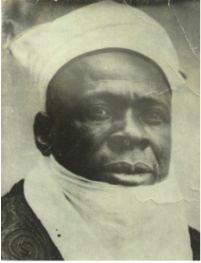

His Royal Highness, Ogiri Oko, Och’Idoma I was born in 1903 and he was the third son of his father, Oko Ode of Ai’Ode clan of Adoka and only son of his mother, Alonyenu (Anyenu) of Ai’Ochanya clan of Iga Okpaya.
Ogiri spent his early childhood with his maternal family in Epe and as a young man he took his turn in guarding his uncle’s millet farm against birds. This farm guarding assignment involved young boys staying on a built deck on the farm for days and making noises to keep birds at bay.
During Ogiri’s time in Epe, there was an outbreak of smallpox and Ogiri and his guard partner contracted the deadly disease during their stay on the farm. While Ogiri survived, his guard partner died from the disease. Ogiri was reported to have brought down the corpse of his guard partner from the deck and buried him before finding his way home a few days later.
On hearing the news of the smallpox outbreak, Anyenu sent messages to her brothers for Ogiri to return to Adoka. And by the following farming season, Ogiri now a tall, handsome, vibrant and hard-working man in his early twenties who had fluent command of Idoma, Igala, Hausa and Epe languages returned to his parents in Adoka.
Back home in Adoka, Ogiri with his loveable and generous spirit, lived a normal and responsible life according to the customs and traditions of the time. It was no surprise when Anyenu married a wife for him.
Ogiri was later to become the Alegwu of Adoka and that was because Oko, who was the Alapa and next in line to become Alegwu, stood aside for his son to become the Alapa after due consultations with Adoka elders and when the reigning Alegwu died, Ogiri became the Alegwu of Adoka. By this time, he already had four wives.
Upon creation of the Idoma Native Authority by the Northern Nigeria Colonial Administration, the need arose for a single chief for Idoma people who hitherto had no clear distinct leader and were politically organised under district clan heads. This development led to the election of Ogiri as Och’Idoma by the twenty-two district clan heads in Idoma Land in 1947.
After his election as the first unitary ruler of Idoma Land, Ogiri encountered opposition to his leadership and the strongest opposition was from a new movement of newly western educated Idoma youths called Idoma Hope Rising Union. These youths were against his rule mainly because Ogiri had no formal education and they obviously did not take into account his multi-lingua capabilities especially his fluent command of Hausa which was the lingua franca of Northern Nigeria at the time.
What Ogiri Oko lacked in western education, was more than amply compensated for in foresightedness, a strong will and presence of mind and body. As head of the Idoma Native Authority, Ogiri, in post-World War II period went on to implement programmes and reforms that made Idoma people and Idoma Land the centre of development within the lower Northern Nigeria. He created the modern day identity of the Idoma people in areas of town planning. He expanded Otukpo, the main town of the Idoma people by dividing Otukpo town into distinct neighbourhoods, with broad streets that have not been improved upon since the 1950s.
He increased the exposure of Idoma people to western education by soliciting the inland movement of missionaries from the East. Before secondary schools were established in Idoma Land, brilliant Idoma sons were sent to secondary schools in Uzuakoli, in the Eastern region and Katsina College in the Northern region.
Aside from education and town planning, Ogiri Oko was instrumental to the building of hospitals, tarred roads, telecommunication connectivity and centralised water supply system in Otukpo. During his reign, he also enacted policies to encourage increase in commerce, by creating district markets, and legislating against farmers carrying their goods for more than ten miles to markets that are visited by commodity traders from the Eastern part of the country.
Ogiri Oko in his capacity as Och’idoma, was a member of the Northern House of Chiefs until his death in 1960. He was succeeded on the throne by his son-in-law, Ajene Okpabi.
His achievements and shortcoming are best appreciated at its time and life, and well captioned in this poem, “Conflict” by Mabel Segun.
Here we stand
Infants, over blown
Poised between two civilizations
Finding the balance irksome
Itching for something to happen
To tip us one way or the other
Groping in the dark for a helping hand
And finding none
I am tired, Oh my God, I am tired
I am tired of hanging in the middle way
But where can I go?
On Tuesday, March 11, 2025, what should have been an ordinary drive home turned into…
Nollywood actress and filmmaker Mercy Aigbe Adeoti has opened up about her love for marriage…
President Bola Ahmed Tinubu has expressed deep appreciation to Nigerians for their goodwill messages and…
Below is the black market dollar to naira exchange rate for today, March 30th, 2025.…
Good morning Nigeria. Welcome to the IDOMA VOICE News roundup of top newspaper headlines in…
Saudi Arabia has officially announced that Eid al-Fitr will be observed on Sunday, March 30,…